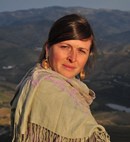 ‘The more we support socially minded businesses the more the demands placed on larger businesses to integrate social principles into the way that they operate will grow. This is our vision.’
‘The more we support socially minded businesses the more the demands placed on larger businesses to integrate social principles into the way that they operate will grow. This is our vision.’
Though she comes from a philanthropic family, Elianna Sabbag Moquette sees herself more as a doer than a donor, spending her time, rather than money, in working for the causes she believes in. Having gained a thorough grounding in development work during her time at the Aga Khan Foundation, she is now moving away from grantmaking in the direction of support for social business. She tells Caroline Hartnell why.
Can you tell me what form your family’s philanthropy takes and what your role is?
There was an active culture of philanthropy in my family, which was all about doing and sharing. When we were small, Dad would take us to a foster home for street kids that he was supporting and Mum would talk about the bipolar women she was speaking with. There were donations, too, but it was much more about your values and how you live your life. Mum and I started to collaborate early on when I was president of the Student Council on the Campus Development Board, and after university we started working with Human Rights Watch. In fact, Mum was responsible for the launch of the Human Rights Watch committee in Geneva.
We also worked together to create GenevaWISE, along with my husband and a few other friends. We realized that many young people in the developing world, who actually live closest to development issues, don’t have the opportunity to engage with the organizations in Geneva that are working to address them. So we created a fund and a system whereby we could give young people access to internships with Geneva-based NGOs and international organizations. About three or four years ago, Mum started Giving Women to help women in Geneva find their way in philanthropy.
What form does it take? It’s what we actively do in our lives. Mum and I have also started a business, Step Up Advisory Group, which supports start-up and growth phase social enterprises, and tries to rally the investment community around impact investing. So I suppose we work with what we see as being needs and create institutions to help meet those needs.
Has your family been involved in philanthropy for a number of generations?
Very much so. My maternal grandfather in particular was a big philanthropist. He was a dynamic, yet modest and discreet man who helped many individuals and causes throughout his life. As an influential figure within his community he felt he had a responsibility to talk about his philanthropy to encourage others to give. My father takes a similar position and when he finds organizations or initiatives he is inspired by, he tends to talk about them to everyone. Barefoot College is a case in point. (Pictured: Barefoot College has been supported by Step Up and Giving Women.)





Comments (0)